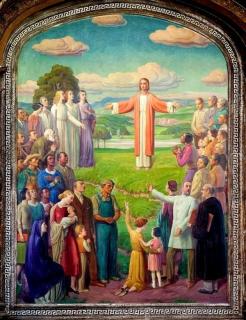Dr. Preston Bradley
Editor’s note: After I posted the piece by Patrick Murfin, Judy Thornber, who had first told me about Preston Bradley, thought that another perspective was needed. Why have two entries on Bradley? One of the few ministers in our tradition who drew a mass following, he warrants more research for that reason alone. In the Dictionary of UU Biography, the entry on Bradley is empty and has not been assigned. Perhaps this second vignette will prod someone to fill that entry.
Another View of Preston Bradley
Judy Thornber

mural by Louis Grell in the Sanctuary of Peoples Church
As a true admirer who heard Preston Bradley on the radio and in person at his church, I saw no sign of megachurch techniques. Bradley did not “orate.” He spoke in a personal, conversational way, revealing his own feelings and thoughts and his high aspirations for what people could do. He acknowledged that times were difficult and many people had enormous problems. It was, after all, the Depression. He did his best to provide hope to his following, without mention of God or Jesus, and to engage in citywide social action with various civic organizations. This man was not an Elmer Gantry type egoist. He was passionate about empathy and support for those with troubles, but not in a “theatrical” way. His true genius was that he simply talked directly to his congregation, both on the radio and in the church, as if they were intelligent people who wanted to lead good lives. He tried to encourage them and keep their hope alive.
Since few of today’s UU ministers can grow membership the way Bradley did, we should seriously study his sermons to understand why they spoke so clearly to people and were so well received by the public. When Bradley spoke, you felt he was speaking to you one on one. He shared himself. He did not pretend to have all the answers. He did preach that hope could be nurtured by persevering and by focusing on leading a good life according to our own best lights.
Where present and past UU preachers have appealed most effectively to the educated and affluent, Bradley uniquely touched the hearts of rich and poor, schooled and unschooled alike. Most of his radio audience and much of the church audience were ordinary folks. The church in its heyday also included many of the rich and notable in Chicago. I was there one morning when Clement Stone, owner of a major insurance company, drove to the church alone in his Cadillac to meet with Bradley on the stage with a special program featuring the Boys Clubs of Chicago, one of Stone’s favorite personal charities.
I never heard Bradley speak of heaven, hell, God, or Jesus. He talked of how each life mattered and how we should try to live ours well. He believed those with means should try to help the less fortunate. He believed that those who were down and out should never give up. He believed in brotherhood and welcomed everyone, rich or poor, of any race or background, to his church. That is what the mural at the front of the church conveyed, and it was staring you in the face every time you attended church and the whole time you were there listening to his sermon. If anything, this was a man ahead of his time. It was the first time I had ever heard such sentiments from a pulpit and I am still hard pressed to hear them expressed there to this day.
Judy Thornber was raised in the Hyde Park neighborhood of Chicago and first heard Preston Bradley on radio. She holds a B.A. in economics and an MBA from the University of Chicago as well as a law degree from Harvard. She has worked over forty years primarily in real estate development. For her, Unitarian Universalism “opened a whole world of possibilities for community and service.”